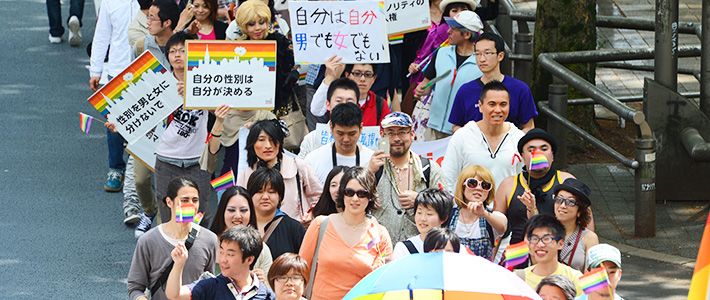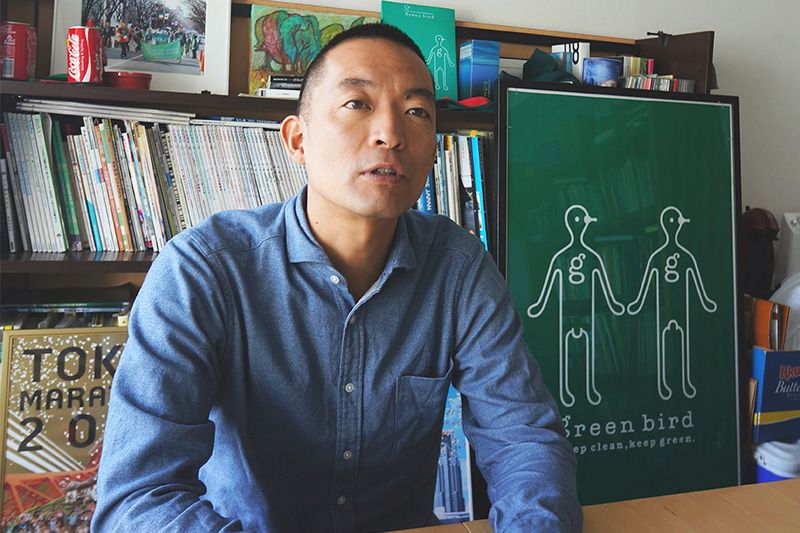
Shibuya Pioneers with Partnership Certificates for Same-Sex Couples
Society Lifestyle- English
- 日本語
- 简体字
- 繁體字
- Français
- Español
- العربية
- Русский
On March 31 the municipal assembly of Tokyo’s Shibuya Ward approved a statute under which the ward will recognize cohabiting same-sex couples as being in a relationship “equivalent to marriage” and will issue documents certifying such relationships.
Although same-sex marriages and civil partnerships conferring comparable legal status are becoming available in a growing number of countries around the world, Shibuya’s is the first move in this direction by a Japanese government organ at any level. With similar plans already outlined by Hosaka Nobuto, mayor of neighboring Setagaya Ward, and positive comments on the move from both Tokyo Governor Masuzoe Yōichi and Yokohama Mayor Hayashi Fumiko, it seems likely that some other local governments will follow suit.
Promoting the Rights of Sexual Minorities
Shibuya officials have described the aim of the scheme as “promoting a gender-equal society in which diversity is respected.” The issuance of the documents, provisionally entitled pātonāshippu shōmei (partnership certificates), is intended to demonstrate respect for the rights of sexual minorities.
Couples recognized under the scheme will be entitled to be treated as a family unit in a variety of situations, including when applying for municipal housing. Local residents and businesses will also be called on to treat such couples with consideration and fairness, respecting the equivalence of their relationship to marriage. In cases of infringement of these couples’ rights, the ward authorities will intervene with guidance and advice; if the violations are serious, the ward will have the right to publicly name those responsible.
The certificates will be available to same-sex couples who are both over the age of 20 and living in Shibuya Ward. The pair will be required to submit notary deeds of mutual guardianship.
Until now, there has been no official recognition in Japan for sexual-minority couples, who have long faced a variety of issues, ranging from prejudice at the individual level to denial of privileges that conventional married couples take for granted, such as full access to a hospitalized partner. Wedding halls have been known to refuse to hold ceremonies for same-sex couples, who have also run into difficulties when trying to rent a house or apartment together.
Striving to Create a Tolerant Community
In a 2012 Dentsu survey of about 70,000 people, 5.2% of the respondents identified themselves as belonging to a sexual minority (lesbian, gay, bisexual, or transgender/transsexual). Of these, more than 60% stated that they experienced day-to-day difficulties connected to their sexuality.
As the list below shows, a considerable number of countries and other jurisdictions, particularly in the West, have decided to legally enshrine the right of same-sex couples to enter into marriages or civil partnerships out of respect for diversity and the rights of sexual minorities. In July 2014, Shibuya Ward established an eight-member committee composed of legal professionals, other experts, and local officials to come up with a proposal for legislation. Through dialogue with sexual minority members, the group gained a sense that, alongside gender equality, protecting the rights of same-sex couples is also an important issue.
In a policy speech at a plenary session of the Shibuya Ward municipal assembly on March 2, Mayor Kuwahara Toshitake emphasized the importance in an increasingly cosmopolitan society of “striving to create a tolerant community, where people treat others with consideration and accept cultural diversity.” In response to reports of young people being driven to school refusal and thoughts of suicide after being cold-shouldered at school because of their sexuality, he said, “We need to act quickly to boost enlightenment on matters of sexual diversity and promote positive self-esteem.” The mayor said he would seek the cooperation of schools in this drive.
Worldwide Availability of Same-Sex Marriage and Civil Partnerships
| Civil partnerships | |
|---|---|
| 1 | Finland |
| 2 | Greenland |
| 3 | Germany |
| 4 | Luxembourg |
| 5 | Italy |
| 6 | San Marino |
| 7 | Andorra |
| 8 | Slovenia |
| 9 | Switzerland |
| 10 | Lichtenstein |
| 11 | Czech Republic |
| 12 | Ireland |
| 13 | Colombia |
| 14 | Venezuela |
| 15 | Ecuador |
| 16 | Australia (some states) |
| 17 | Israel |
| 18 | Hungary |
| 19 | Austria |
| 20 | Croatia |
| 21 | Isle of Man |
| 22 | Jersey |
| 23 | Gibraltar |
| 24 | Malta |
| 25 | Estonia |
| Same-sex marriage | |
|---|---|
| 1 | Netherlands |
| 2 | Belgium |
| 3 | Spain |
| 4 | Norway |
| 5 | Sweden |
| 6 | Portugal |
| 7 | Iceland |
| 8 | Denmark |
| 9 | France |
| 10 | South Africa |
| 11 | Argentina |
| 12 | Canada |
| 13 | New Zealand |
| 14 | Uruguay |
| 15 | Britain |
| 16 | Brazil |
| 17 | United States (some states) |
| 18 | Mexico (some states) |
| 19 | Estonia (from 2016) |
Information supplied by Shibuya Ward
Any full-scale shift to recognition of same-sex marriage or civil partnerships will of course require action at the national level. At present there, however, is little sign of any such movement either within the administration or in the National Diet.
Diversity Breeds Creativity
The first suggestion that Shibuya Ward should provide recognition for same-sex couples came from independent assembly member Hasebe Ken in June 2012. Mayor Kuwahara was noncommittal in his initial response, saying merely that the ward would study the matter. But as additional legislators signed on to the proposal, the stance of the ward government became more positive.
 Shibuya municipal assembly member Hasebe Ken answers questions at his Jingūmae office.
Shibuya municipal assembly member Hasebe Ken answers questions at his Jingūmae office.
Following a career in advertising, Hasebe established Green Bird, a nonprofit organization aimed at addressing local garbage problems, before being elected as an assembly member in 2003. “I had some gay colleagues in my NPO days, and learning about the issues they faced really gave me something to think about. In other countries, same-sex couples are not seen as anything unusual, and I thought it would be good if we got over our petty hang-ups here too, accepting diversity and allowing such couples to become a normal sight.”
Shibuya has a population of some 200,000. Its districts include such fashion hotspots as Omotesandō, Harajuku, Daikanyama, and Hiroo, with a high density of shops selling brand goods and apparel, as well as an abundance of beauty salons and the offices of fashion firms. And its history as a trend leader for Japanese youth stretches back to the mid-1970s, the era of gaudily dressed, line-dancing youngsters known as takenoko-zoku (bamboo-shoot tribe). In the 1990s it was the epicenter of the explosion of interest in domestic fashion brands that became known as the “DC brand boom” (DC being short for “designers and characters”), along with the Shibu-kaji (Shibuya casual) look and the Shibuya club music scene.
But there are those who feel that Shibuya’s power as a driving force for youth culture has waned in recent years. Hasebe, who also senses this threat, declares: “One of the keys to a creative locale is the diversity required for new cultural movements to gestate. This was another reason I thought Shibuya should be the first to introduce recognition for same-sex partnerships.”
The move in Shibuya Ward marks a departure from prevailing Japanese attitudes to sexual minorities. Kamikawa Aya, who became Japan’s first openly transgender public official when she was elected to the municipal assembly in Setagaya Ward in May 2003, commented: “It’s definitely progress when people whose existence had been ignored up to now gain official recognition. There’s a big difference between zero and one.”
Ishikawa Taiga, an openly gay former (April 2011–December 2014) member of the Toshima Ward municipal assembly, calls for legalization for gay marriage in Japan: “People in Japan tend to be strongly averse to taking actions that have no precedent. But this [move by Shibuya] provides one. The response from the general public has been very positive, so I have great hopes for progress in terms of gay rights in this country.”
(Banner Photo: Celebrating diversity at Shibuya’s Rainbow Pride Parade, April 29, 2012. © Aflo)
marriage Shibuya LGBT diversity homosexuality gay lesbian bisexual transsexual transgender